| Listing 1 - 10 of 45 | << page >> |
Sort by
|
Book
ISBN: 157312818X 9781573128186 9781573126670 1573126675 Year: 2013 Publisher: Macon, Ga.
Abstract | Keywords | Export | Availability | Bookmark
 Loading...
Loading...Choose an application
- Reference Manager
- EndNote
- RefWorks (Direct export to RefWorks)
Book
ISBN: 0585227845 9780585227849 9780836198225 0836198220 0836136217 9780836136210 Year: 1993 Publisher: Scottdale, Pa. Herald Press
Abstract | Keywords | Export | Availability | Bookmark
 Loading...
Loading...Choose an application
- Reference Manager
- EndNote
- RefWorks (Direct export to RefWorks)
Christianity --- Religion --- Philosophy & Religion --- Bible. --- Philemon (Book of the New Testament) --- Colossians (Book of the New Testament) --- Kolosserbrief (Book of the New Testament) --- Commentaries.
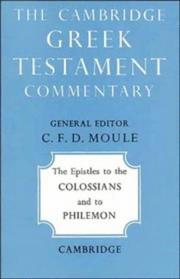
ISBN: 0511598084 0521042526 0521092361 Year: 1958 Publisher: Cambridge : Cambridge University Press,
Abstract | Keywords | Export | Availability | Bookmark
 Loading...
Loading...Choose an application
- Reference Manager
- EndNote
- RefWorks (Direct export to RefWorks)
This is a theological commentary on the Greek text; on the foundation of linguistic detail is based a doctrinal exposition. The first section of the Introduction is on the religious ideas of the epistles, and frequent allusion is made throughout the commentary to works on New Testament theology. There are special notes on many of the important theological terms such as 'knowledge', 'mystery', pleroma, as well as on linguistic points, such as the use of the reflexive pronoun. But attention is devoted also to critical and introductory matters, and this is, it is believed, the first commentary on Colossians and Philemon to discuss in some detail the theories of Professors E. J. Goodspeed and J. Knox. The commentary is documented with references to works in English, French and German, for those who wish to follow up the study in greater detail. But the aim has been to make the exposition as far as possible self-contained and intelligible to a reader with no other books before him than the New Testament in Greek and the Old Testament in English.
Christianity. --- Christianity --- Religions --- Church history --- Bible. --- Philemon (Book of the New Testament) --- Colossians (Book of the New Testament) --- Kolosserbrief (Book of the New Testament) --- Arts and Humanities --- Religion
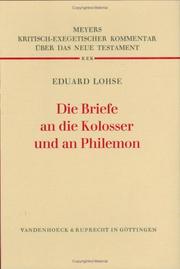
ISBN: 3525516363 366651636X Year: 1977 Publisher: Göttingen Vandenhoeck und Ruprecht
Abstract | Keywords | Export | Availability | Bookmark
 Loading...
Loading...Choose an application
- Reference Manager
- EndNote
- RefWorks (Direct export to RefWorks)
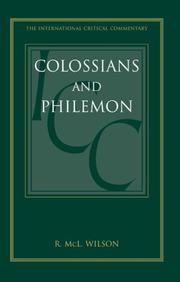
ISBN: 0567044718 9780567044716 Year: 2014 Publisher: London Bloomsbury
Abstract | Keywords | Export | Availability | Bookmark
 Loading...
Loading...Choose an application
- Reference Manager
- EndNote
- RefWorks (Direct export to RefWorks)
Bible NT. Epistles of Paul. Colossians --- Bible NT. Epistles of Paul. Philemon --- Bible. --- 227.1*6 --- Brief van Paulus aan de Colossenzen. Brief van Paulus aan Philemon --- 227.1*6 Brief van Paulus aan de Colossenzen. Brief van Paulus aan Philemon --- Philemon (Book of the New Testament) --- Colossians (Book of the New Testament) --- Kolosserbrief (Book of the New Testament)
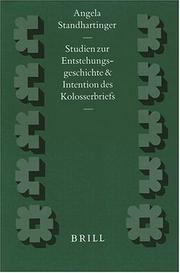
ISSN: 01679732 ISBN: 9004112863 9004267425 9789004267428 9789004112865 Year: 1999 Volume: 94 Publisher: Leiden Brill
Abstract | Keywords | Export | Availability | Bookmark
 Loading...
Loading...Choose an application
- Reference Manager
- EndNote
- RefWorks (Direct export to RefWorks)
This volume examines the Epistle to the Colossians as a pseudepigraphic letter. It is concerned with how different traditions associated with Paul and his thought were appropriated by Pauline communities in the aftermath of his death. Extensive attention is paid to the possibility of Colossians' interaction with oral traditions, which includes consideration of the oral context for Paul's own correspondence and ministry. In recovering these traditions, Colossians creates a heavenly letter and a testament, designed so as to assure readers of the apostle's ongoing aid and to interpret the theological significance of his death. The analysis of different literary and rhetorical characteristics of Colossians (pseudephigraphy, orality, et cetera) is placed within the context of both contemporaneous Jewish (esp. Sapiential) traditions and the traditions of the Greco-Roman philosophic schools. One chapter deals with the origin and purpose of the 'Haustafel'.
Bible. --- Criticism, interpretation, etc. --- Bible --- Criticism, interpretation, etc --- 227.1*6 --- Brief van Paulus aan de Colossenzen. Brief van Paulus aan Philemon --- Theses --- 227.1*6 Brief van Paulus aan de Colossenzen. Brief van Paulus aan Philemon --- Colossians (Book of the New Testament) --- Kolosserbrief (Book of the New Testament) --- Bible. N.T. Colossians
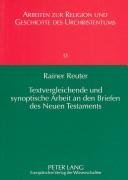
ISBN: 3631502451 Year: 2003 Volume: 13 Publisher: Frankfurt am Main Lang
Abstract | Keywords | Export | Availability | Bookmark
 Loading...
Loading...Choose an application
- Reference Manager
- EndNote
- RefWorks (Direct export to RefWorks)
226.1 --- 227.1 --- Evangelies: synoptici; synoptisch probleem; Q; Quelle --- Brieven van Paulus--(algemeen) --- 227.1 Brieven van Paulus--(algemeen) --- 226.1 Evangelies: synoptici; synoptisch probleem; Q; Quelle --- Bible. --- Philemon (Book of the New Testament) --- Epistles (Books of the New Testament) --- Colossians (Book of the New Testament) --- Kolosserbrief (Book of the New Testament) --- Criticism, interpretation, etc.
Book
ISBN: 185075473X 9781850754732 Year: 1994 Volume: 96 Publisher: Sheffield JSOT
Abstract | Keywords | Export | Availability | Bookmark
 Loading...
Loading...Choose an application
- Reference Manager
- EndNote
- RefWorks (Direct export to RefWorks)
Identifying the group or position that the author of Colossians attacks in ch 2 of that letter has long occupied scholars, but no interpretative consensus has resulted. This study details the inadequacy of existing reconstructions and offers in their stead the portrait of philosophically inclined Gentiles drawn to the Jewish community and then to the Christian congregation by ideas and practices congenial with their view of the world. Central to the Colossian philosphy's outlook was the pursuit of divine knowledge or wisdom through (1) the order of the cosmic elements (2.8, 20); (2) the bodily
Bible --- Criticism, interpretation, etc --- 227.1*6 --- Brief van Paulus aan de Colossenzen. Brief van Paulus aan Philemon --- Bible -- Criticism, interpretation, etc. --- Bible. N.T. Colossians -- Criticism, interpretation, etc. --- Religion --- Philosophy & Religion --- Christianity --- 227.1*6 Brief van Paulus aan de Colossenzen. Brief van Paulus aan Philemon --- Bible. --- Colossians (Book of the New Testament) --- Kolosserbrief (Book of the New Testament) --- Criticism, interpretation, etc.
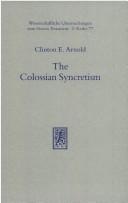
ISBN: 3161464354 9783161464355 Year: 1995 Volume: 77 Publisher: Tübingen Mohr Siebeck
Abstract | Keywords | Export | Availability | Bookmark
 Loading...
Loading...Choose an application
- Reference Manager
- EndNote
- RefWorks (Direct export to RefWorks)
Bible --- Criticism, interpretation, etc --- 227.1*6 --- Brief van Paulus aan de Colossenzen. Brief van Paulus aan Philemon --- 227.1*6 Brief van Paulus aan de Colossenzen. Brief van Paulus aan Philemon --- Bible. --- Colossians (Book of the New Testament) --- Kolosserbrief (Book of the New Testament) --- Criticism, interpretation, etc.
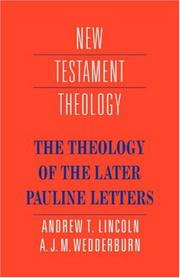
ISBN: 0521364604 0521367212 9780521367219 9780521364607 9780511520488 0511520484 Year: 1993 Publisher: Cambridge Cambridge University press
Abstract | Keywords | Export | Availability | Bookmark
 Loading...
Loading...Choose an application
- Reference Manager
- EndNote
- RefWorks (Direct export to RefWorks)
This volume investigates the respective theologies of the Letters to the Colossians and the Ephesians, and in so doing provides an accessible introduction to the themes and significance of these New Testament books. A. J. M. Wedderburn examines the background to Colossians, and considers both its readers' situation and that of its author. He asks whether the proponents of the teaching against which this letter is written were Christians, putting forward their views as the true form of Christianity (as in Galatia), or whether they existed outside the Christian community as a seductive alternative to it. Andrew T. Lincoln examines in turn the authorship of Ephesians, and tries to explain the letter's strategy of persuasion and the key elements of its teaching about the new identity of the Christian believer. The similarities and differences between the thought of Ephesians and that of Paul are thereby set out clearly. Both sections of the book reflect on the relevance of these letters for today.
Bible. --- Bible --- Theology. --- Criticism, interpretation, etc --- Theology --- 227.08 --- Paulinische theologie --- 227.08 Paulinische theologie --- Ebesosŏ (Book of the New Testament) --- Epheserbrief (Book of the New Testament) --- Ephesians (Book of the New Testament) --- Colossians (Book of the New Testament) --- Kolosserbrief (Book of the New Testament) --- Criticism, interpretation, etc. --- Arts and Humanities --- Religion
| Listing 1 - 10 of 45 | << page >> |
Sort by
|

 Search
Search Feedback
Feedback About UniCat
About UniCat  Help
Help News
News